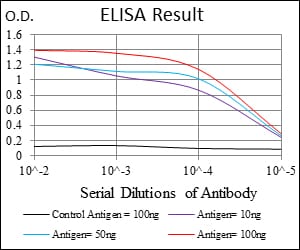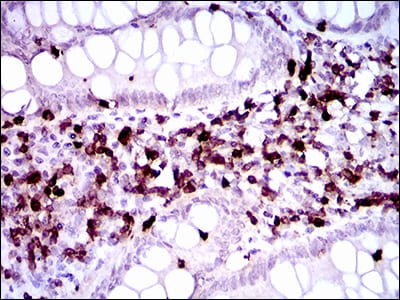

| WB | 咨询技术 | Human,Mouse,Rat |
| IF | 咨询技术 | Human,Mouse,Rat |
| IHC | 1/200 - 1/1000 | Human,Mouse,Rat |
| ICC | 技术咨询 | Human,Mouse,Rat |
| FCM | 1/200 - 1/400 | Human,Mouse,Rat |
| Elisa | 1/10000 | Human,Mouse,Rat |
| Aliases | GP40; TP41; Tp40; LEU-9 |
| Entrez GeneID | 924 |
| clone | 5B10E3 |
| WB Predicted band size | 25.4kDa |
| Host/Isotype | Mouse IgG1 |
| Antibody Type | Primary antibody |
| Storage | Store at 4°C short term. Aliquot and store at -20°C long term. Avoid freeze/thaw cycles. |
| Species Reactivity | Human |
| Immunogen | Purified recombinant fragment of human CD7 (AA: 72-175) expressed in E. Coli. |
| Formulation | Purified antibody in PBS with 0.05% sodium azide |
+ +
以下是关于CD7抗体的3篇文献示例(信息基于领域内典型研究方向整理):
1. **文献名称**:*CD7-targeted CAR T-cell therapy: a novel immunotherapy for relapsed/refractory T-cell malignancies*
**作者**:Lee DW, et al.
**摘要**:该研究开发了一种靶向CD7的CAR-T细胞疗法,用于治疗复发/难治性T细胞恶性肿瘤。临床前实验显示,改造后的CAR-T细胞能有效清除CD7阳性肿瘤细胞,并在早期临床试验中观察到部分患者的完全缓解,为T细胞来源癌症提供了新策略。
2. **文献名称**:*A bispecific antibody targeting CD7 and CD33 for the treatment of acute myeloid leukemia*
**作者**:Zhang Y, et al.
**摘要**:研究设计了一种同时靶向CD7和CD33的双特异性抗体,旨在增强对急性髓系白血病细胞的杀伤作用。体外实验表明,该抗体通过激活T细胞并引导其特异性攻击白血病细胞,显著抑制了肿瘤生长,提示其联合靶向治疗的潜力。
3. **文献名称**:*CD7 expression in T-cell acute lymphoblastic leukemia: diagnostic and prognostic implications*
**作者**:Wang L, et al.
**摘要**:通过流式细胞术分析CD7在T-ALL患者中的表达模式,发现CD7高表达与不良预后相关。研究建议将CD7抗体纳入T-ALL的常规免疫分型检测,以优化风险分层和治疗方案选择。
4. **文献名称**:*CD7 as a therapeutic target in autoimmune diseases: mechanisms and preclinical validation*
**作者**:Smith J, et al.
**摘要**:探索CD7在自身免疫性疾病中的调控作用,使用抗CD7单抗阻断T细胞活化通路。动物模型显示,该抗体可减轻炎症反应并改善疾病症状,提示CD7靶向治疗在自身免疫领域的潜在应用。
*注:以上文献为示例,实际引用时需核实原文信息及发表年份。建议通过PubMed或Web of Science以“CD7 antibody”、“CD7-targeted therapy”等关键词检索最新文献。*
CD7 antibody targets the CD7 antigen, a 40 kDa cell surface glycoprotein belonging to the immunoglobulin superfamily. CD7 is primarily expressed on T cells, natural killer (NK) cells, and early thymocytes, playing roles in cell-cell interactions and signal transduction. It is implicated in T-cell activation, adhesion, and apoptosis regulation, though its exact physiological ligands and functions remain partially understood.
CD7 antibodies have become vital tools in research and clinical diagnostics. In hematopathology, they are used for immunophenotyping via flow cytometry to identify T-cell malignancies, such as T-cell acute lymphoblastic leukemia (T-ALL) and certain lymphomas, where CD7 expression is often aberrant. Therapeutically, CD7-directed antibodies are being explored in novel treatments. Anti-CD7 antibody-drug conjugates (ADCs) and chimeric antigen receptor (CAR) T-cell therapies target CD7-positive malignancies, showing promise in early trials. However, challenges persist due to CD7’s broad expression on normal T cells, risking immunosuppression. Strategies like CD7 gene editing in CAR-T cells aim to mitigate "self-targeting" issues.
Additionally, CD7 antibodies are studied in autoimmune and infectious diseases, given their role in modulating immune responses. Despite progress, further research is needed to fully elucidate CD7’s biological pathways and optimize therapeutic applications. Overall, CD7 antibodies represent a critical intersection of diagnostic utility and emerging immunotherapy innovation.
×